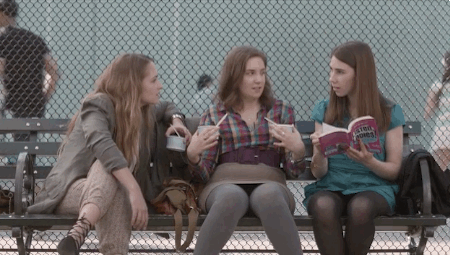From the editor
Issue 3, July 2014
The theme for Peephole’s third issue is "women and television."
Midway through the second episode of Girls an infamous scene takes place. In it, Jessa, Hannah and Shoshanna sit on a park bench in sunny New York City, eating frozen yogurt as they complain about their relationships. Putting down her deliciously icy snack, Shoshanna reaches for her bag and produces a copy of Listen up, Ladies: a self-help book about dating. She reads an excerpt. "I have one question," Hanna remarks, "Who are…the ‘ladies’?" "Obvi" Shoshanna replies, "We’re the ladies." This sparks an argument. "We’re the ladies!" Shoshanna asserts. But are they?
In this issue, Dave Crewe, Alexandra Donald, Anders Furze, Janice Loreck, Nikki Richardson, Hayley Summers and I offer our thoughts on "women and television" in the first of Peephole’s issues to explore a single theme and medium. Collectively, we ask: who are "the ladies" of television and what do we (the spectators, the critics, the thinkers and dreamers) have to say about them? I challenged these writers to pick a shot from a television series that they could use to answer these questions and to explore the topic "women and television." As you will see from the depth of this issue, I received intelligent and engaging pieces.
To begin, Dave explores sexuality and empowerment in Game of Thrones while Alexandra writes about the changing face of friendships within Girls. Anders explores Laura Dern in Enlightened while Janice uses a shared look between two characters as the starting point for an in-depth discussion of identification and detection in Top of the Lake. Nikki critiques neoliberal ideas of happiness through her analysis of Ally McBeal; a series that deserves far more critical attention, as she so persuasively argues. Hayley explores associations between women and suburbia within Australian popular culture, drawing attention to the ways that Kath & Kim both celebrates and satirises the suburban dream. Lastly, my attention fixates on the small details of Orange is the New Black as I examine the possible narrative futures of queer women on the small screen.
It is interesting to note, however, that the vague request for an article exploring "women and television" has consistently turned up similar results. All of the articles in this issue discuss middle-class white women; all bar one are from US-produced television. While "woman" is a broad discursive category, it consistently conjures a narrow range of images and representations. If we want to consider anything other than this narrow definition of who "the ladies’" are, or to explore television from countries other than the United States, must these goals be explicitly stated? But does this risk further ghettoising marginalised women? That is, further contributing to a discourse in which the teen or the old or the working class, the ugly or fat, the trans or queer, and women of colour sit alongside but not within the broader category of "woman"? These are not new questions but we must continue to ask them.
Whitney Monaghan, Editor

